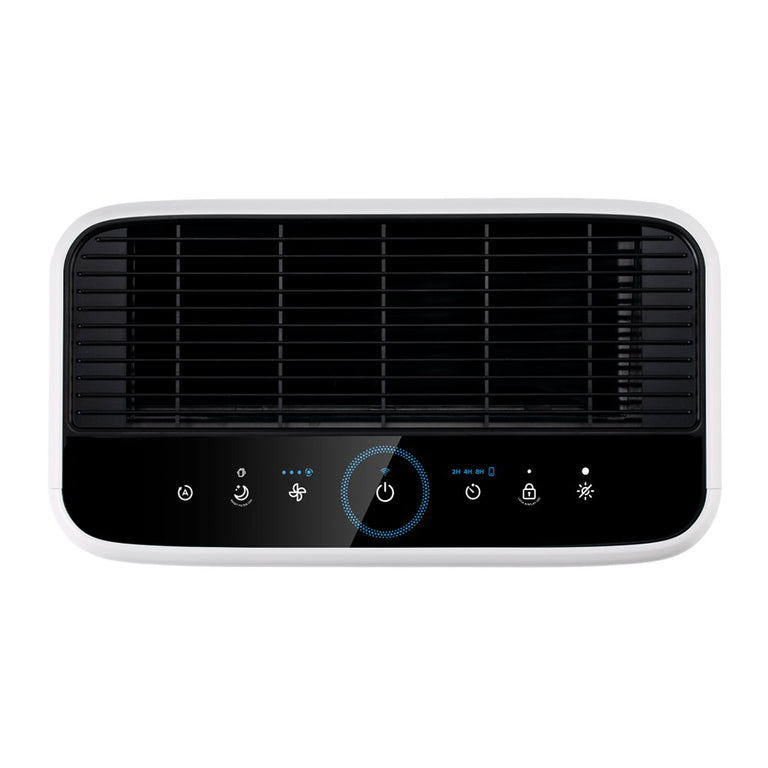
What Water Should You Use in Your Humidifier?
-
1 min read
From Tap to Mist: Understanding the Best Water for Humidifier Efficiency
Choosing the right water for your humidifier is one of the most important things you can do to prevent mineral and scale buildup. Tap water, while convenient, contains minerals that, over time, cause difficult-to-clean buildup on your humidifier. On the other hand, distilled water is free from these minerals and contaminants, making it the best option for humidifiers. Regular use of distilled water also reduces the frequency and intensity of maintenance required for your humidifier, ensuring efficient operation. By understanding the impact different types of water have, you can make an informed decision the next time you go to fill up your humidifier.
Why Does Water Type Matter for Your Humidifier?
Choosing the right kind of water for your humidifier is more than just a matter of preference—it affects the device's performance, longevity, and quality of the mist you breathe.
The performance of a humidifier largely depends on the kind of water it processes. Using tap water, which often contains high levels of minerals, can cause white dust to accumulate. This white dust is not only a nuisance to clean, but is also a sign that your humidifier might be working harder than it needs to be. The mineral content in tap water can also cause scale buildup inside the humidifier, requiring more frequent and rigorous cleaning and maintenance.
Common Types of Water Used in Humidifiers
Understanding the differences between tap water, bottled water, distilled water, spring water, and reverse osmosis water is the first step to choosing the right water type for your humidifier.

Tap Water
This is the most accessible option for most people, but it's not always the best choice for your humidifier. Tap water typically contains minerals that can lead to the buildup of white dust in your home and scale within the device, necessitating more frequent cleaning. However, specific humidifiers, like Levoit’s Superior 6000S, are specially designed to be okay for use with tap water. Always check the manufacturer’s recommendations before using tap water, and proceed only if the manual explicitly states that tap water can be used.
Bottled Water
It might seem like a convenient and safe alternative to tap water, but bottled water also often contains minerals unsuitable for humidifier use. The mineral content varies widely among brands, and some may be as high in minerals as tap water, posing similar issues with mineral deposits and white dust.
Distilled Water
Distilled water is often recommended as the best for humidifiers due to its purity. The distillation process removes minerals and impurities, making distilled water the optimal choice to prevent white dust and scale buildup. This can help extend the life of your humidifier and maintain a cleaner indoor air environment.
Spring Water
While natural and often marketed for its healthy mineral content, there are better choices for humidifiers than spring water. Like tap water, the minerals that make spring water beneficial for drinking can contribute to the white dust problem and scale buildup in humidifiers.
Reverse Osmosis Water
Reverse osmosis water undergoes a filtration process that removes many of the impurities and minerals found in tap water. This makes it a much better option than tap or spring water for humidifiers, as it minimizes the risk of mineral buildup and white dust. If you have a reverse osmosis system correctly installed and properly operating , or are considering getting one, this could be an alternative to using distilled water in your humidifier.
High Mineral Content and White Dust
Though cost effective, tap water typically contains minerals, such as calcium and magnesium, left behind when water evaporates from your humidifier. This mineral residue manifests as a white dust that can settle on furniture, electronics, and other surfaces in your home.
While tap water is a convenient and seemingly inexpensive option for your humidifier, its high mineral content could pose significant issues. Opting for distilled or purified water can help avoid these problems, ensuring your humidifier functions efficiently.
The Benefits of Using Distilled Water in Your Humidifier
Distilled water is recommended by many experts and manufacturers for use in humidifiers, and for good reasons.
Low Mineral Content Preserves Your Humidifier
Distilled water undergoes a rigorous process of boiling and condensation, effectively removing minerals, impurities, and contaminants. This purity means that when you use distilled water in your humidifier, there's a significant reduction in the likelihood of mineral deposits forming within the device. These deposits can clog the humidifier's working parts and reduce efficiency. Using distilled water helps to ensure that your humidifier operates smoothly, maintaining its performance over time without the interference of mineral buildup.
Minimizing Maintenance and Cleaning Requirements
The purity of distilled water offers another significant advantage: it greatly reduces the need for frequent rigorous cleanings. Humidifiers, particularly those that operate with tap water, can require regular maintenance to remove mineral buildup. Humidifiers remain cleaner for longer periods when distilled water is used since it’s more likely to be free from the minerals contributing to these issues.
Exploring Alternatives: Bottled, Spring, and Reverse Osmosis Water
Alternative water sources for your humidifier, such as bottled water, spring water, and water treated by reverse osmosis, can provide different benefits and drawbacks depending on the specific needs of your humidifier and your personal preferences.
Bottled Water
Bottled water is often perceived as a clean and safe option for humidifiers. However, it's important to note that the mineral content in bottled water can vary significantly depending on the brand and source. While using bottled water might reduce some concerns associated with tap water, it doesn't always guarantee a low mineral content. Additionally, regularly purchasing bottled water for your humidifier can add up, making it a less economical choice over time.
Spring Water
Spring water, valued for its natural filtration and mineral content for drinking, might not be the best choice for humidifier use either. The minerals in spring water can lead to the same issues as tap water when used in humidifiers, including mineral buildup and thus, the potential for white dust dispersal.
Reverse Osmosis Water
Water treated by reverse osmosis undergoes a filtration process that removes a significant portion of its mineral content, making it a closer alternative to distilled water. This process can effectively strip the water of a substantial amount of contaminants and minerals, reducing the risk of mineral buildup and white dust production in your humidifier. Reverse osmosis water can be a practical choice for those looking to balance purity and cost, especially if a properly functioning reverse osmosis system is already installed in your home for drinking water. However, while it is purer than tap or spring water, it may still contain trace minerals compared to the absolute purity of distilled water, and the system needs to be in proper working condition in order to effectively filter out many minerals.
While bottled and spring water can offer benefits like convenience, their varying mineral contents can still pose challenges for humidifier maintenance and indoor air quality. Reverse osmosis water presents a more suitable alternative, with a reduction in minerals that closely aligns with the benefits of distilled water. Considering the pros and cons of each type of water, distilled water remains the optimal choice for humidifiers
Maintenance Tips: Cleaning Your Humidifier and Preventing Bacteria and Mold
Maintaining your humidifier through regular cleaning is critical to prevent the buildup of bacteria and mold, which can compromise the device's efficiency and, more importantly, your health. Regardless of the water you choose for your humidifier, diligent maintenance is key to ensuring your humidifier operates safely and effectively.

Essential Cleaning Steps
- Unplug: Always start by unplugging your humidifier.
- Empty and Rinse: Empty any standing water from the tank and base. Rinse these components with clean water to remove any residue or film.
- Use Natural Cleaning Agents: Use white vinegar and water for a deep clean. Fill the tank with this solution and let it sit for at least 30 minutes. Vinegar is effective at breaking down mineral deposits and disinfecting without harsh chemicals.
- Scrub and Sanitize: After the vinegar solution has done its work, scrub the tank and any other parts with a soft brush to remove buildup. A small amount of baking soda can act as a gentle abrasive for areas with stubborn mineral deposits.
- Rinse Thoroughly: Rinse all parts thoroughly with clean water to ensure no cleaning solution remains.
- Dry Completely: Ensure all parts are completely dry before reassembling to prevent immediate microbial growth. It can be effective to leave components to air dry or wipe them down with a clean towel.
- Replace Filters Regularly: If your humidifier uses a filter, follow the manufacturer's guidelines for replacement. Filters can harbor bacteria and mold, reducing air quality and humidifier efficiency.
Frequently Asked Questions
Can I Use Tap Water If I Don't Have Access to Distilled Water?
Yes, but with precautions. While there are certain humidifiers that are specifically designed to be used with tap water, like the Superior 6000S, it's the use of tap water that can eventually lead to mineral buildup and white dust, so clean your humidifier more frequently and use a filter if possible. Consult the manufacturer's guidelines for specific advice.
How Often Should I Clean My Humidifier to Prevent White Dust?
Clean every 1 to 2 weeks to prevent mineral deposits and white dust, especially if using tap water. Increase cleaning frequency to weekly for heavy use or when using tap water.
Is Bottled Water an Effective Alternative to Distilled Water for My Humidifier to Reduce Mineral Buildup?
Bottled water can vary in mineral content, and some may still cause white dust. It's more effective than tap water but less effective than distilled water in preventing mineral buildup. Choose low-mineral bottled water if distilled water is unavailable.
Can I Use Boiled Water as an Alternative to Distilled Water for My Humidifier?
Boiling tap water is a common method to purify water by killing bacteria and removing some impurities. While boiling can kill most bacteria and viruses, it has a limited effect on the mineral content of the water. These minerals remain largely unaffected by boiling. As a result, boiled water may be better for your humidifier than tap water, but it doesn't address the core issue of mineral deposits that can hamper the efficiency of your humidifier.
What are the Signs I'm Using the Wrong Kind of Water in My Humidifier?
Signs include white dust on nearby surfaces, faster scaling inside the humidifier, and reduced mist output. These indicate high mineral content in the water. Switch to distilled water to mitigate these issues.
Making an Informed Choice for Your Humidifier's Water
Making an informed choice about the water for your humidifier is crucial. By opting for distilled water, you can ensure your humidifier works efficiently, with fewer maintenance hassles. This choice not only protects your investment in the humidifier but also supports the well-being of your household.
Important Note
The information provided here is for informational and educational purposes only and should not be used in medical emergencies or for diagnosing or treating any medical condition. It's crucial to consult a licensed medical professional for diagnosis and treatment. External links are for informational purposes and do not constitute endorsements. No warranty of any kind, either expressed or implied, is made as to the accuracy, reliability, timeliness, or correctness of the information provided herein.
Citations:
Environmental Protection Agency
Featured Products
-
NewModel: LEH-S601S-WUSRegular price $249.99Unit price perRegular price
- New
- Smart
- Large rooms
-
Best SellerModel: Classic 300SRegular price $69.97Unit price perRegular price
$79.99$69.97- Smart
- 1-3 Gallons
-
Best SellerModel: LV600HH
- 1-3 Gallons
-
Best SellerModel: LV600SRegular price $109.99Unit price perRegular price
- New
- Smart
- 1-3 Gallons










